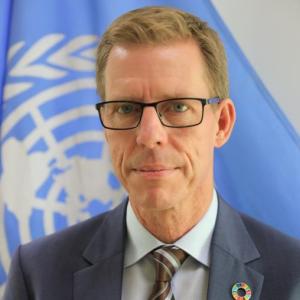Your Royal Highness Princess Basma bint Talal,
Your Excellency Eng. Musa Al-Maayta, Minister of Parliamentary and Political Affairs, and Chair of the Inter-ministerial Committee for Women’s Empowerment
Dr. Salma Nims, Secretary General of the Jordanian National Commission for Women
Distinguished guests and colleagues,
It is my great pleasure to join you today to commemorate International Women’s Day and to pay tribute to the inspiring women leaders in Jordan who are bringing lasting change to their communities as part of the Jordan’s centennial celebrations.
During a year like no other, it seems fitting that we are also celebrating women at the forefront of the battle against COVID-19.
From high job losses to exploding burdens of unpaid care, from disrupted schooling to an escalating crisis of domestic violence, women’s lives have been upended, in Jordan as well as all over the world. The consequences will far outlast the pandemic.
Since the onset of COVID-19, and by working closely with the Jordanian National Commission for Women and civil society organizations, the Government of Jordan had put in place significant measures to counteract the negative impact of the pandemic.
This included targeted action to meet the needs of vulnerable women and girls, such as survivors of domestic violence, small and medium enterprises run by women, and various social protection schemes to support those most in need.
The timely review of national priorities under the National Strategy for Women 2020-2025 to respond to emerging needs is another example of Jordan’s leadership in shaping a more equal future and recovery from the COVID-19 pandemic. As UN system, we remain fully committed to supporting your vision.
Looking ahead, targeted gender-responsive investments, economic stimulus packages and recovery plans are now considered fundamental strategies for sustainable recovery, with vulnerable women at the centre.
The return of investment is multiple. Global evidence shows that social care expansion and redistribution can have a positive impact not only to gender equality but also to interlinked issues of poverty reduction, decent jobs creation and equality by socio-economic status.
Most importantly, when women lead and are fully engaged in such processes, we see positive results. By way of example, when more women participate in public life and policymaking, the entire society can benefit as greater emphasis and resource allocations point to social policies, environmental priorities and issues like health, education, childcare, infrastructure, ending violence against women.
As the UN Secretary General emphasized, we are seeing it ourselves at the United Nations, where we have achieved gender parity in UN leadership posts for the first time in history.
Another priority area of action is strengthening all women’s voices, including those of women facing multiple and intersecting forms of discrimination, leaving no one behind in public life.
This is a collective responsibility and media in Jordan - both women and men - played a key role in both raising awareness on COVID-19 as well as in narrating the ‘new normal’, creating a sense of unity and solidarity in times of confinement. There are several lessons learnt and good practices, especially in terms of reaching out to the most vulnerable.
I look forward to today’s dialogue and to continue working closely with media partners to sustain momentum on our joint advocacy efforts towards a gender-responsive recovery plan for Jordan.
In concluding, and as Jordan’s attention turns towards recovery and resilience, we look forward to this opportunity of catalyzing joint action and advocacy to engage and empower women in this process and achieve an inclusive and transformative recovery. It also reminds us that inclusive decision-making and sustainable solutions are critical to not only an effective pandemic response and recovery but also to peaceful, secure and stable societies.
Thank you.


